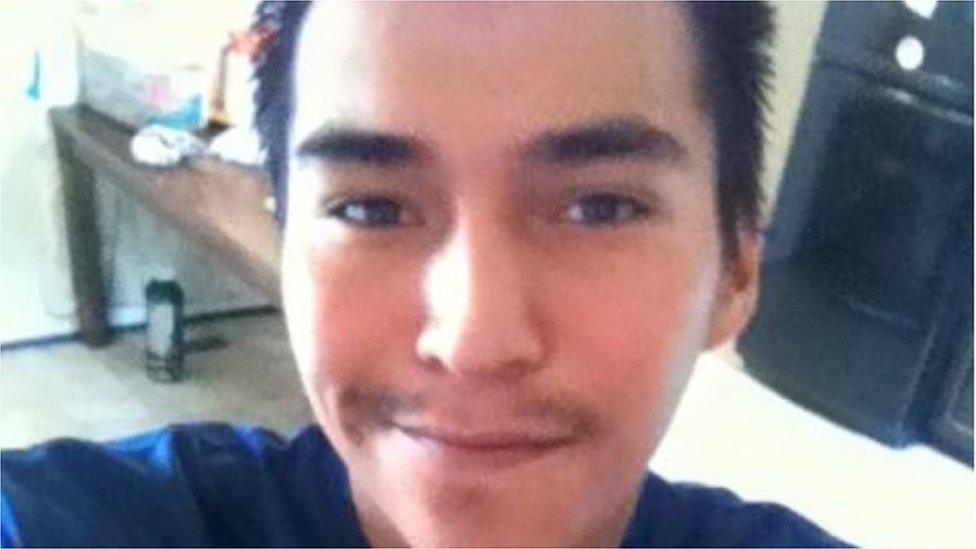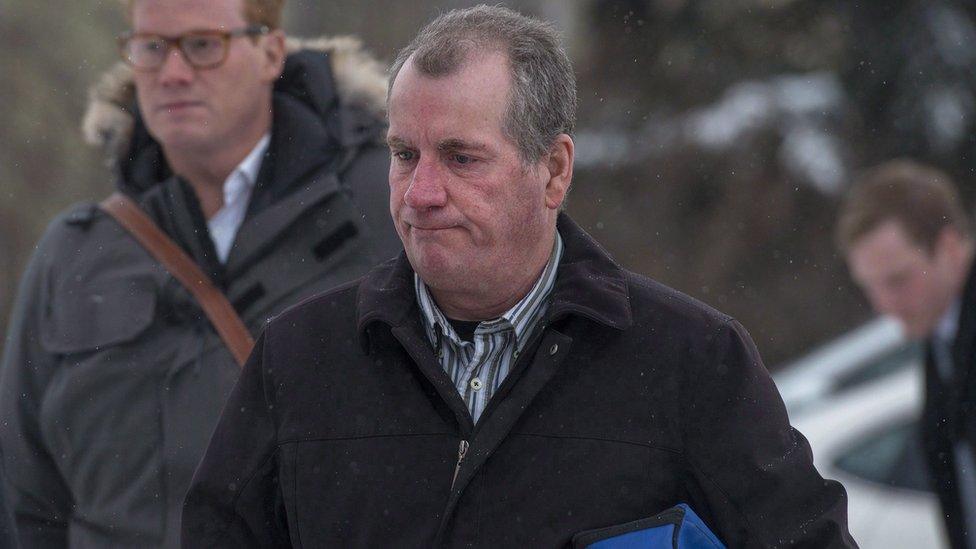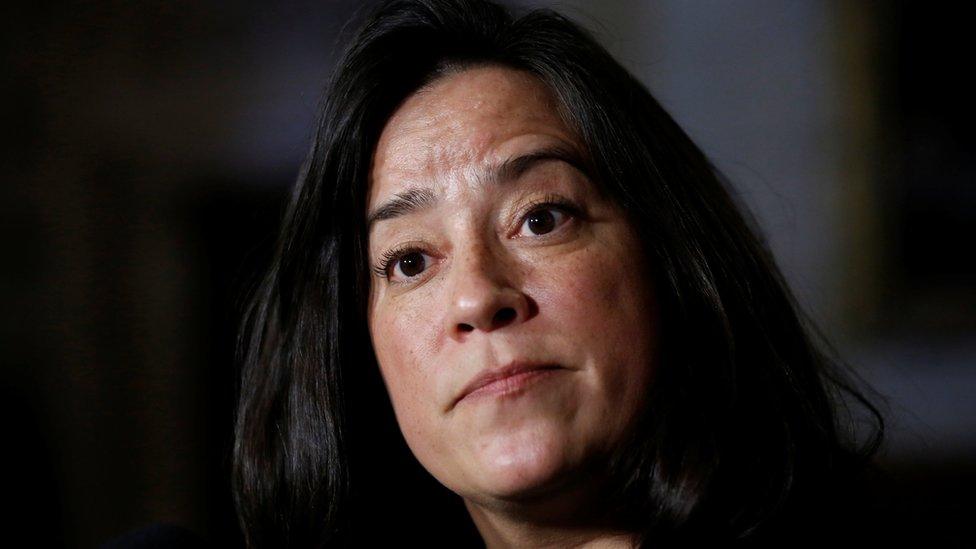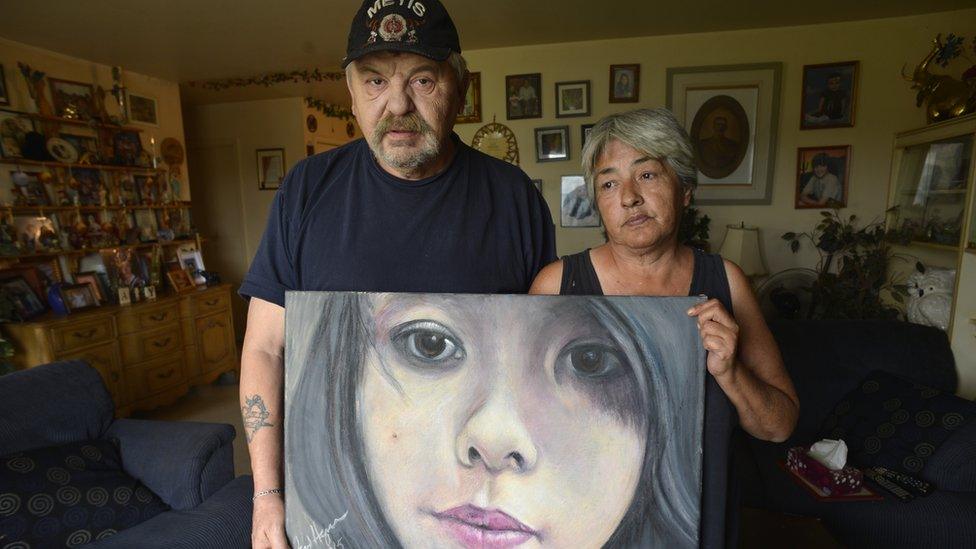Colten Boushie family calls for justice reforms in Ottawa
- Published

Colten Boushie
The family of a young Canadian indigenous man killed in 2016 are in Ottawa calling for justice system reform.
On Friday, a jury acquitted white farmer Gerald Stanley, 56, of second-degree murder in the shooting death of Colten Boushie, 22.
The case revealed underlying racial tensions in Canada.
"Justice for Colten" became a rallying cry for the protests that swept across Canada.
The verdict prompted condolences from Canadian Prime Minister Justin Trudeau and Justice Minister Jody Wilson-Raybould.
Boushie was a Cree man from the Red Pheasant First Nation in the Canadian province of Saskatchewan.
The jury who delivered the verdict had no visible indigenous members.
His cousin, Jade Tootoosis, told journalists in Ottawa on Monday that representation on juries is among the issues the family is raising with members of Mr Trudeau's Cabinet and other politicians.
Allow X content?
This article contains content provided by X. We ask for your permission before anything is loaded, as they may be using cookies and other technologies. You may want to read X’s cookie policy, external and privacy policy, external before accepting. To view this content choose ‘accept and continue’.
"Some people state that race has nothing to do with this process, yet the defence felt threatened by an indigenous person being on the jury," she said.
"I think that speaks volumes."
Asked whether the lack of representation on the jury may have changed the outcome, she said: "It may have. But we'll never know."
In 2013, a former Supreme Court justice issued several recommendations to increase indigenous representation on juries in Canada.
On Monday, Mr Trudeau told parliamentarians that "we understand there are systemic issues in our criminal justice system we must address".
GoFundMe campaigns have been launched in support of both Mr Stanley and Boushie's family.
Allow X content?
This article contains content provided by X. We ask for your permission before anything is loaded, as they may be using cookies and other technologies. You may want to read X’s cookie policy, external and privacy policy, external before accepting. To view this content choose ‘accept and continue’.
Saskatchewan Premier Scott Moe met the family over the weekend and said there is a need for a "dialogue" on racism across Canada.
"We respect the decisions of the justice system and its independence, but as we move forward it's incumbent on us as a government to have those very important, very challenging conversations with our aboriginal community here in the province," he said.
He also said the province is taking steps to address concerns about an increase in rural crime.
What happened on 9 August, 2016?
Some of details as to what happened that night remain contested.
But around 5:30pm local time, Boushie and four friends drove onto Mr Stanley's property near Biggar, a rural community about 100 km (62 miles) from Saskatoon.

Gerald Stanley was acquitted by a jury in the shooting death of Colten Boushie
The friends had spent the day drinking and swimming in a nearby river.
After getting a flat tyre on their car, they drove on to a farm seeking help.
Mr Stanley and his son were working on a fence on the farm when they said they heard what they believed was one of their own vehicles starting up, and thought it was being stolen.
They both ran towards Boushie's vehicle, an SUV. Mr Stanley kicked the taillight and his son hit the windshield with hammer.
The farmer said he also grabbed a handgun and fired off a couple of warning shots.
A third bullet hit Boushie in the back of the head, killing him.
After the shooting
The day after the shooting, the Royal Canadian Mounted Police (RCMP) released a brief media statement which said a gun was discharged following a verbal exchange.
The police noted that three of the people in the SUV were "taken into custody as part of a related theft investigation".
The Federation of Sovereign Indigenous Nations, which represents 74 First Nations in Saskatchewan, criticised the RCMP release as providing "just enough prejudicial information for the average reader to draw their own conclusions that the shooting was somehow justified".

The Boushie family will meet federal Justice Minister Jody Wilson-Raybould
Racist vitriol and anti-indigenous sentiment bubbled up online in the wake of Boushie's death.
A local councillor resigned, external after posting on Facebook that Mr Stanley's "only mistake was leaving witnesses".
A few days after the shooting, former Saskatchewan Premier Brad Wall released a statement on Facebook, external, condemning "racist and hate-filled" comments being posted on social media and asking residents "to rise above intolerance".
The RCMP warned some of the online comments could be considered criminal.
Boushie's family also said the RCMP mistreated them when they were informed of his death. They claimed the officers were insensitive and searched their home without permission.
An internal RCMP investigation, external later said the officers behaved appropriately.
Police also faced criticism they did not show due care in the investigation.
Critics pointed to, among other factors, the fact the door of the SUV was left open in the rain, leaving blood-spatter evidence exposed to the elements.
Meanwhile, farmers groups said they feel vulnerable due to a rise in thefts and property damage in recent years, and that police are not doing enough to protect them.
The trial
Mr Stanley's trial began on 30 January.
Eric Meechance, who was in the SUV with Boushie, testified that one of the group tried to break into a truck on a nearby farm before they drove onto Mr Stanley's property.
He said they were not there to steal but to fix the tyre.
Mr Meechance and another man fled the SUV during the altercation. He recalled hearing gunshots.
In his testimony, Mr Stanley says he grabbed the gun to scare off the group.
He said he removed the gun's magazine after firing warning shots and that the gun just went off when he reached towards the SUV's ignition.
He said his finger was not on the trigger.
Mr Stanley's lawyer argued that the shot that killed Boushie was a "freak accident" caused by the gun's malfunction.
The Crown dismissed the malfunction argument and maintained Mr Stanley carelessly handled the firearm.
The jury deliberated for about 13 hours before acquitting Mr Stanley.
- Published29 November 2017

- Published31 May 2017
